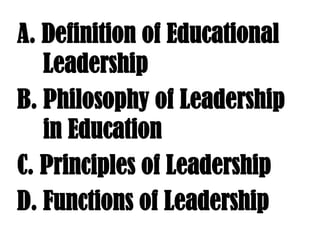
Educational Leadership
- 1. A. Definition of Educational Leadership B. Philosophy of Leadership in Education C. Principles of Leadership D. Functions of Leadership
- 2. What Is Educational Leadership?
- 3. Educational Leadership is a term applied to school administrations that strive to create positive change in educational policy and processes.
- 4. Educational leaders are trained to advance and improve educational systems or institutions. Educational leaders usually are employed as school principals or administrators but take on additional roles, such as department chair or academic dean.
- 5. Philosophy of Leadership in Education Why is a Philosophy of Leadership Important? Philosophy is "the rational investigation of the truths and principles of being, knowledge or conduct." Philosophy is the attainment of an integrated, comprehensive view of life, of vital importance. Furthermore, "values, ethics and virtues are actually secondary. . ." to the absolute necessity to couch these attributes within a personal philosophy.
- 6. Vision The first element to consider in developing a philosophy of leadership. One of the best general descriptions of vision is that vision must be idealistic and a "mental model of a future state of the organization."
- 7. Values Values serve as our moral compass to guide every soldier, from private to general, through the maze of intellectual, philosophical and emotional issues that encompass our life.
- 8. Leader Development You should include three essential leader-development components in your leadership philosophy: formal schooling, leader training within your organization and empowerment.
- 9. Managing Change Anyone who has ever tried to initiate organizational change has probably heard, "We tried that and it didn’t work" or "We have always done it this way." Change is not always easy for an organization’s members. However, change is inevitable.
- 10. Diversity One area of leadership philosophy often overlooked is the strength of leveraging diversity in our organizations. Men and women, of various ethnic, racial, religious backgrounds and experiences, reflect the treasured differences that make us a unique and powerful organization.
- 11. Maintain a Sense of Humor Although having a sense of humor is not a theme in everyone’s philosophy of leadership, I believe it is important and extremely healthy for a positive command climate. You have to know how to laugh, especially at yourself. Humor can very often diffuse a potentially tense situation.
- 12. Principles of Leadership 1. Know yourself and seek self-improvement. 2. Be technically proficient. 3. Seek responsibility and take responsibility for your actions.
- 13. 4. Make sound and timely decisions. 5. Set the example. 6. Know your people and look out for their well-being.
- 14. 7. Keep your people informed. 8. Develop a sense of accountability, ownership and responsibility in your people.
- 15. 9. Ensure that tasks are understood, supervised, and accomplished. 10. Train your people as a team.
- 16. Functions of Leadership Educational leaders work to improve educational programming. They hire and manage teachers and staff, prepare budgets, set curriculum standards and set school-wide policy. They might work on team building efforts or restructure the organization to affect necessary change.
- 17. The leader as executive -> top co-ordinator of the group activities and overseer of the execution of policies.
- 18. The leader as planner -> deciding the ways and menas by which the group achieves its ends. This may involve both short-term and long-term planning.
- 19. The leader as policy maker -> the establishment of group goals and policies.
- 20. The leader as expert -> a source of readily available information and skills, although there will be some reliance on technical expertise and advice from other members of the group.
- 21. The leader as external group representitive -> the official spokesperson for the group, the representative of the group and the channel for both outgoing and incoming communication.
- 22. The leader as controller of internal relations -> determines specific aspects of the group structure.
- 23. The leader as perveyor of rewards and punsihment -> control over group members by the power to provide rewards and apply punishments.
- 24. The leader as arbitrator and meditator -> controls interpersonal conflict within the group.
- 25. The leader as exemplar -> a model of behaviour for members of the group, setting an example of what is expected.
- 26. The leader as symbol of the group -> enhancing group unity by providing some kind of cognitive focus and establishing the group as a distinct entity.
- 27. The leader as substitute for individualresponsibility -> relieves the inividual member of the group from the necessity of, and responsibility for, personal decision.
- 28. The leader as ideologist -> serving as the source of beliefs, values and standards of behaviour for individual members of the group.
- 29. The leader as father figure -> serving as the focus for the positive emotional feelings of individual members and the object for identification and transference.
- 30. The leader as scapegoat -> serving as a target for agression and hostility of the group, accepting blame in the case of failure.
